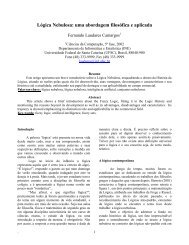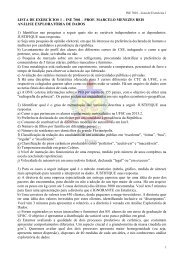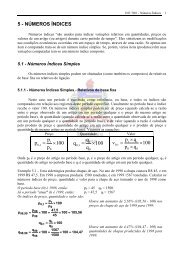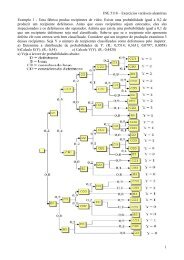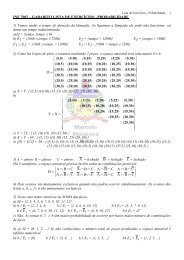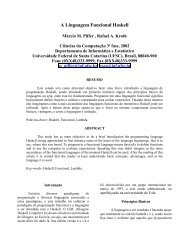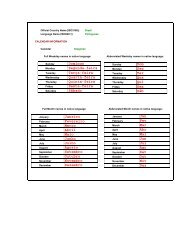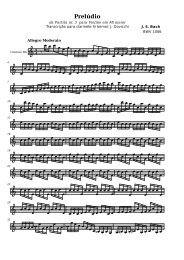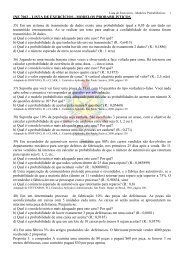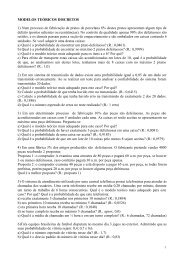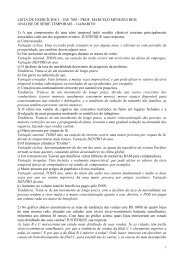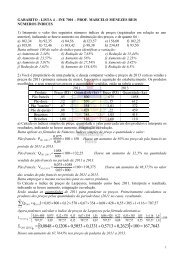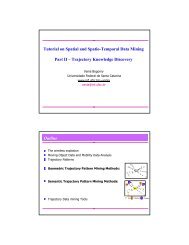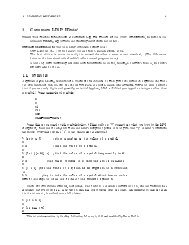Anais do IHC'2001 - Departamento de Informática e Estatística - UFSC
Anais do IHC'2001 - Departamento de Informática e Estatística - UFSC
Anais do IHC'2001 - Departamento de Informática e Estatística - UFSC
You also want an ePaper? Increase the reach of your titles
YUMPU automatically turns print PDFs into web optimized ePapers that Google loves.
<strong>Anais</strong> <strong>do</strong> IHC’2001 - IV Workshop sobre Fatores Humanos em Sistemas Computacionais 185<br />
collections that classified according to the schema of the US Library of Congress and other<br />
<strong>do</strong>main-specific taxonomies.<br />
TD (Digital Theses). Our library is now providing means to store and retrieve the theses<br />
produced by the university’s graduating stu<strong>de</strong>nts. We offer gui<strong>de</strong>lines for stu<strong>de</strong>nts to<br />
produce TD-compliant digital <strong>do</strong>cuments, mechanisms to convert from various word<br />
processing formats into our TD data mo<strong>de</strong>l, and a wi<strong>de</strong> range of access and retrieval<br />
options.<br />
Zeus. We also have <strong>de</strong>veloped an environment for collaborative revision and annotation of<br />
digital theses [Fernán<strong>de</strong>z et al. 2000a]. This is an asynchronous, role-aware interface,<br />
highly personalizable system component that allows theses advisors and committee<br />
members to review and annotate digital theses via user-<strong>de</strong>fined conventions.<br />
Viajerus. We are collaborating with other digital library efforts in different institutions. In<br />
or<strong>de</strong>r for our users to benefit from this collaboration, we have <strong>de</strong>vised mobile agents that<br />
attend to user queries and visit digital collections at our partner’s libraries and gather<br />
information in a transparent fashion [Chevalier et al. 2001].<br />
SyReX. Users of U-DL-A’s digital library can receive content-based and collaboratively<br />
generated recommendations about relevant information resources via this software<br />
component [Ramírez 2001].<br />
RDU (U-DL-A Digital Reserve). This component provi<strong>de</strong>s access to digitized materials<br />
that are traditionally available at the Reserve section of aca<strong>de</strong>mic libraries. Users have<br />
priority access to materials ma<strong>de</strong> available for their courses or research projects. Materials<br />
may be viewed on graphical computer displays and searched over according to various<br />
criteria [Rodríguez 2001].<br />
2.2 Aiming for seamlessness<br />
One distinctive element of our work in digital libraries is our view of information and<br />
collaboration spaces as comprising both the digital and physical realms. We believe the<br />
needs posed by scholarly activities can be best satisfied if traditional resources as well as<br />
the novel digital facilities are accessible to users at any given time in a seamless fashion. In<br />
this regard, we have been integrating traditional on-line catalogs and user services (such as<br />
lending materials, selective information dissemination and other notification services) into<br />
our new <strong>de</strong>velopments. As can be expected, software components such as UVA, SyReX<br />
and RDU consi<strong>de</strong>r that both digital and physical resources should be accessible to users.<br />
Even though each software component may facilitate seamless access to some library<br />
resources, the diversity of such components as well as the size and dynamic nature of<br />
digital collections and user communities have the potential to make the digital library a<br />
complex and unwieldy environment for end users. Means are nee<strong>de</strong>d to ensure that<br />
individual users have access to exactly the resources they are entitled to according to their<br />
roles, needs and preferences. Providing more than what a user needs unnecessarily<br />
increases the system’s complexity and the user’s cognitive overload. On the other hand,<br />
limiting access excessively would result in system un<strong>de</strong>r-utilization (and user frustration).<br />
The nee<strong>de</strong>d compromise could be the result of explicitly eliciting and addressing every<br />
user’s needs and preferences. Alternatively (and this is our approach), users could have at



